
Businesses are spending more money on content marketing than ever before. In fact, in 2020 50% of B2B marketers and 59% of B2C marketers said they planned to increase their content marketing budget.
But creating outstanding content isn’t an easy feat, which is why CMO’s need to invest in the best technology possible.
This guide walks through the reasons why every business needs content analytics in their MarTech stack. Whether you’re a marketing team leader or a content strategist, check out our new guide to content analytics and start up-leveling your content game:
- Why traditional web analytics and business intelligence tools don’t work
- The value marketers gain when they have access to content analytics
- How to take a more data-driven approach to your content strategy
A CMO’s Guide to Content Analytics
Content marketing and the way we measure content performance have come a long way since the major digital transformation that began in the 1990s and rapidly accelerated as the workplace changed profoundly over the past two years.
Today, content marketers are spending billions on data analytics, AI-based content management, and content measurement software. In fact, in 2020 50% of B2B marketers and 59% of B2C marketers planned to increase their content marketing budget.
Unfortunately, CMOs don’t always choose the right resources to measure the impact their content marketing team has on their business. With MarTech companies specializing in every niche of the marketing ecosystem, companies tend to invest in various software solutions that address specific yet unrelated needs.
The result? Different tech for different measurements without a single, streamlined source of truth for content measurement.
That’s why successful content teams use simpler, smarter content analytics solutions to create better content and prove the impact of their work. This guide details why CMOs and executives who are willing to rethink their legacy tech stacks are now choosing this type of technology for content measurement.
The challenges facing content marketers
Historically, content marketers have focused too much on content creation and not enough on content measurement.
According to Semrush’s 2020 State of Content Marketing report, measuring content marketing success is a surprisingly low priority for organizations, with proving ROI, improving attribution, and overall content measurement cited as frustrations.
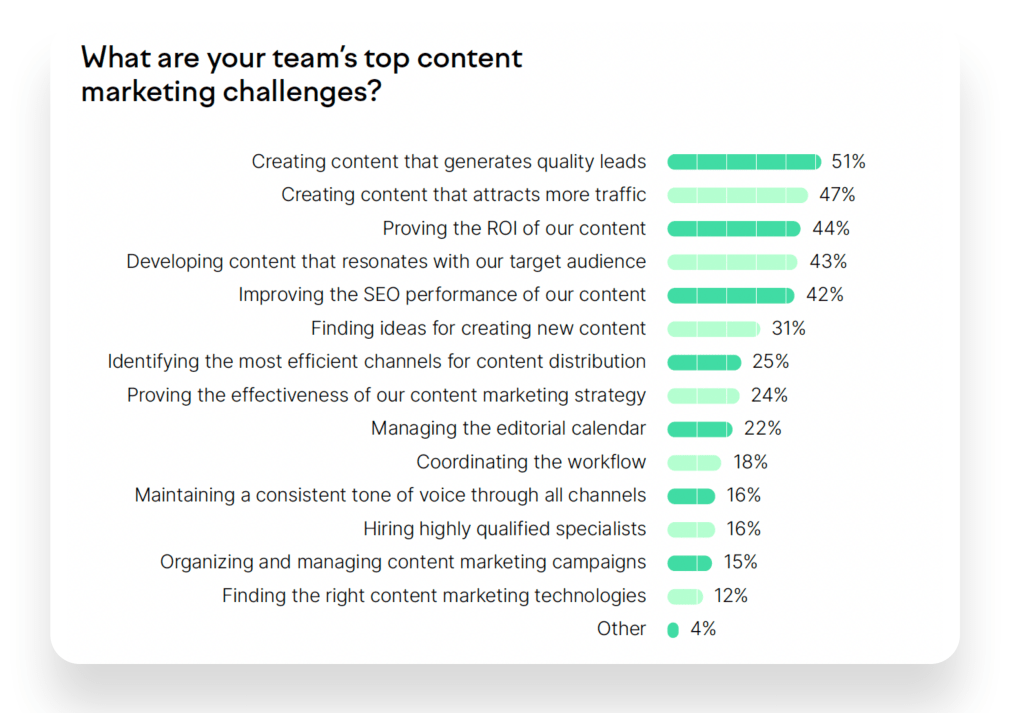
Furthermore, 59% of content marketers aren’t satisfied with how they’re currently tracking content performance, and only 24% of marketing leaders see their current MarTech solutions as strategic for their business.
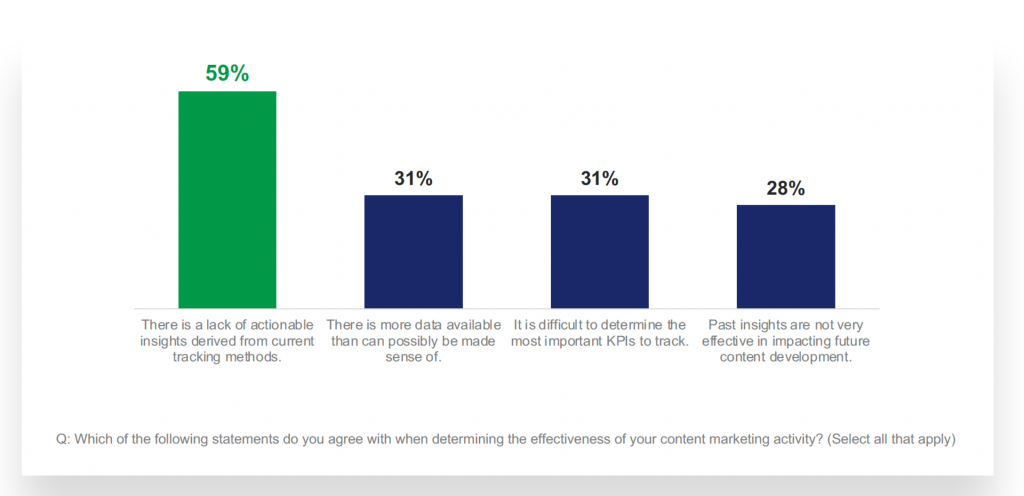
Your digital, sales development, brand, and comms teams all have streamlined solutions to track their impact. But what about your content team? They should have the specialized solutions they need to manage their performance too, instead of relying on piecemeal metrics that ultimately don’t help them build a competitive content marketing function.

Getting the right metrics
Your team is probably doing many things right already: rapidly and consistently producing content, and diversifying their efforts through multi-channel marketing, social media, and SEO. As their strategies become more elaborate, however, things can become more cumbersome.
That’s where having a single source of truth around content performance becomes so important. Your goal should be to be able to answer the following questions within one content measurement platform:
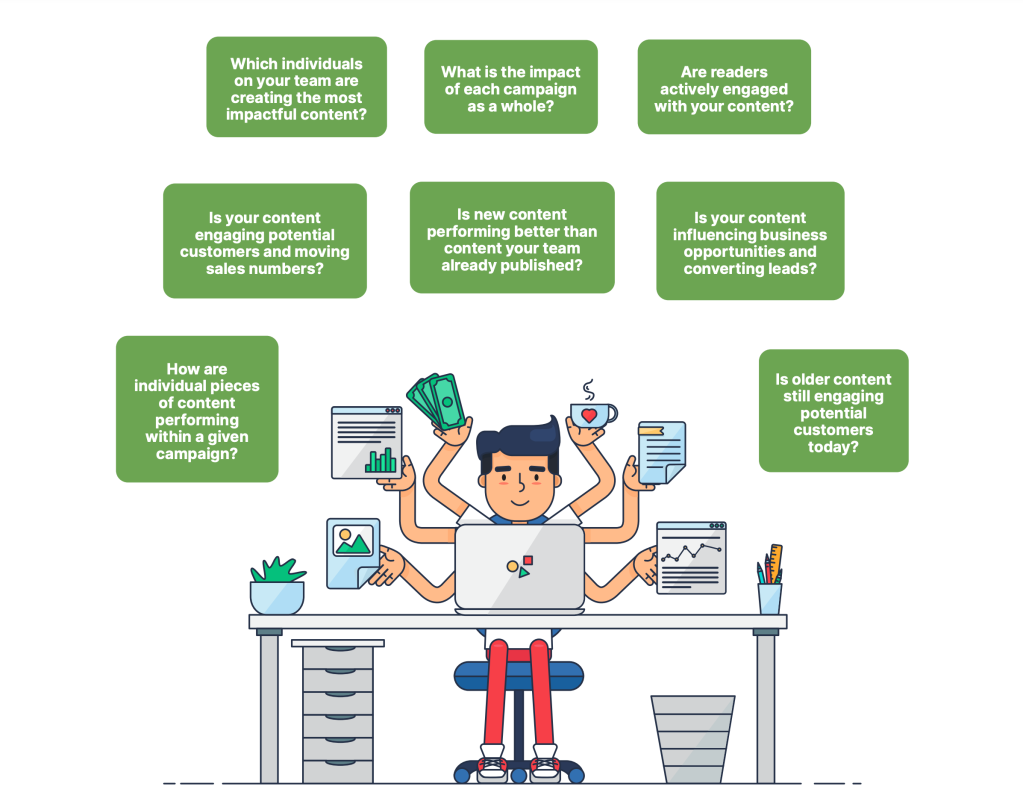
The problem with traditional web analytics
Many organizations have tried to use traditional web analytics tools like Google or Adobe to collect engagement data and measure content performance. However, these legacy platforms and their antiquated metrics have become less useful for content marketing teams as the industry has evolved.
They make it difficult and time-consuming to distill overall content performance into a digestible format, which leaves CMOs and marketing departments relying on insignificant vanity metrics to measure success. This issue is particularly problematic for smaller content teams with limited time and resources.
The average content marketer spends more than 10 hours a week reporting on content
performance. That’s wasted time if the data they’re reporting on isn’t providing a realistic gauge of success.
Effective content teams and marketing organizations need to understand how their content and campaigns contribute to their overall company goals—quickly, easily, and accurately.

Gaps in content measurement
The shortcomings of traditional web analytics solutions become clear when you consider the problems they were built to solve: ecommerce and overall website optimization—not content measurement and the needs of content teams. That’s why so many marketers feel they lack actionable insights to influence content marketing ROI.
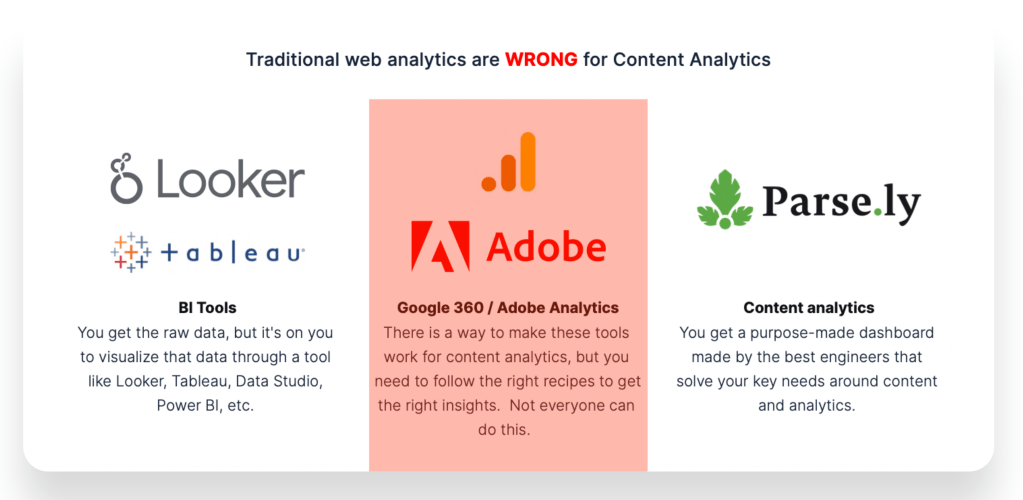
What else is your team missing with traditional web analytics?

Much time and effort goes into creating blog posts, maintaining a social media presence, and running a website. Without being able to effectively measure the performance of all associated content, this time and effort is wasted.
We know it can be challenging to prove the value of your content marketing program. We also know that legacy marketing technology has likely been less than helpful. That’s why the most successful organizations use evolved, modern content analytics solutions to measure content and support their business.
Evolving your MarTech stack with content analytics
The best MarTech resource in a CMO’s toolkit, one that goes beyond SEO optimization and
surface-level metrics, is a content analytics platform. Only with content analytics can your team become truly data-focused on content performance and leveraging it to realize business goals.
We’re in the midst of the Great Resignation, and consequently we’re hiring in a seller’s market for talent. Now more than ever, the most talented content professionals in the marketplace will want to work with the right tools: smart, modern content analytics solutions.
While evolving your current tech stack requires an initial financial investment, the ROI from
implementing a content analytics platform is significantly greater than relying on vanity metrics.
Companies already employing content intelligence platforms have seen these rewards first hand. They monetize their content more effectively, turn data touch points into actionable insights, and drive more ROI. So as you restructure and dedicate budgets to your MarTech stack, don’t forget to prioritize content analytics.
Visibility, activation, justification
Adopting a content analytics platform gives your team crucial, content-based insights. Don’t blindly ideate, create, and repeat. Instead, get visibility into what content impacts your business, act on those insights to optimize your content strategy, and justify your efforts with clarity.
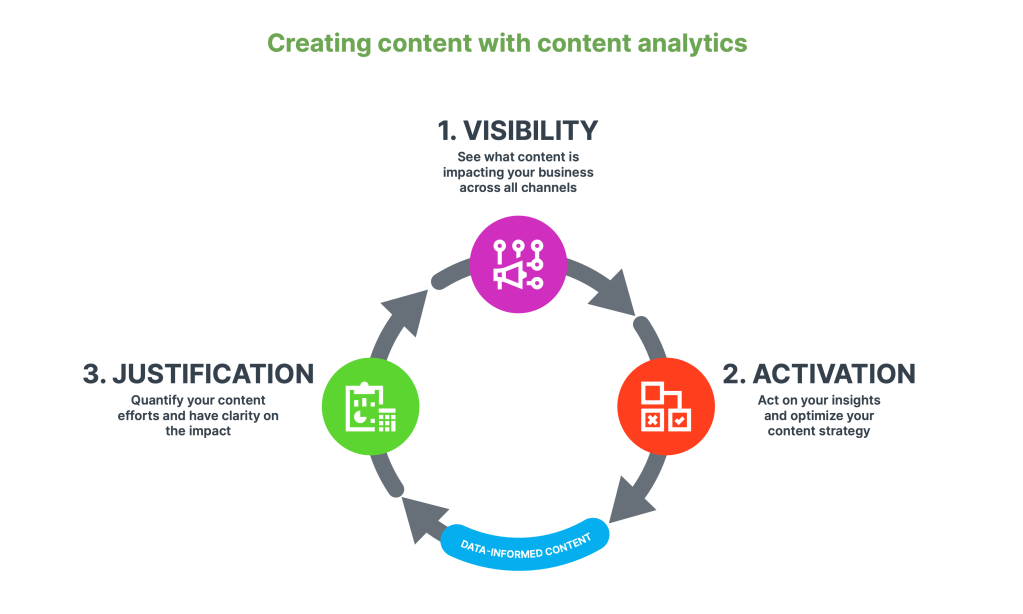
With content analytics, your team can:
- Measure the time users spend truly engaged with every asset and webpage— allowing them to make a customized content journey for potential customers.
- See what content converts readers to leads—giving a clear picture of the ROI on their content marketing.
- Compare content against itself on all channels—discovering what works and what needs more development.
- Unearth and optimize hidden gems in their content archive—saving them time and resources while maximizing their impact.
- Create fast, easy-to-access content performance reports—so you can regularly check in on their progress.
Save time and improve collaboration
Working with measurement platforms built specifically for content teams not only promotes audience growth, brand strengthening, and revenue generation, but it also saves your team tons of effort reporting on their performance.
When they can spend less time sifting through data to prove the worth of their content, they can spend more time using that content to make an impact. You’ll also have a pulse on that impact so you can feel confident in their efforts.
Content analytics also provides transparency, visibility, and consistency in your content
measurement processes to promote a culture of collaboration and knowledge sharing across your organization. With the variety of ways different teams in your organization use content, it’s crucial to use an analytics solution that allows everyone to be speaking the same language.

Why CMOs should invest in content analytics
In 2022 and beyond, the only way to create highly effective and personalized content is to use content analytics to understand your target audience and create more of the content that they value.
Use smarter technology to see how users engage with your site and inspire them with better and more engaging content. Stop guessing, and start making data-informed decisions.
Ready to learn how your organization can create smarter content that drives real business impact?
Talk to the content analytics experts at Parse.ly and get a demo today.